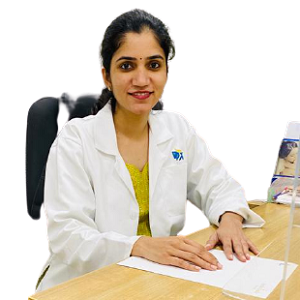Additional genes from the 21st chromosome bring on a genetic disorder called Down syndrome. Certain traits result, such as cognitive impairment and other developmental delays. An upward slant of the eyes, a flattened bridge of the nose, a single, deep groove on the palm, and a loss of muscular tone are typical physical characteristics. A child with Down syndrome could not exhibit all of these characteristics.
Why Does Down Syndrome Occur?
Every human cell, except egg and sperm cells, typically contains 46 chromosomes. Normally, each egg and sperm cell contains 23 chromosomes.
When chromosome 21 randomly manifests as an extra copy in the egg or sperm, this is the most frequent cause of Down syndrome. When the egg and sperm unite during creation, an additional copy of chromosome 21 spreads throughout every embryo cell, giving each of them 47 chromosomes instead of the typical 46.
Less frequently, following conception, the embryo's cells may include an extra copy of the chromosome. This phenomenon, known as mosaicism, causes some cells to have 46 and others to have 47 chromosomes.
What Aspects Of Down Syndrome Are Most Typical?
Numerous infants with Down syndrome are born with one or more of the following characteristics:
- Poor muscular tone (muscles that are "floppy."
- Small ears, a wider neck than usual, a single crease across the palm, and a space between the first and second toes. A flatter face with upward-slanting eyes.
- There is a connection between intellectual disability and Down syndrome.
What Distinguishes A Down's Syndrome Diagnostic Test From A Screening Test?
Doctors can perform two tests to check for Down's syndrome during pregnancy: a screening test and a diagnostic test.
It is critical to realize that the Down syndrome screening test cannot definitively determine whether or not the baby has the condition.
You will typically be offered a diagnostic test if your screening test indicates a high likelihood that the baby has Down's syndrome. Before the baby is born (prenatally), a diagnostic test is performed to determine with certainty whether or not the developing child has Down's syndrome. The two basic prenatal diagnostic procedures are chorionic villus sampling and amniocentesis.
Conclusion
Take care of your connections with your spouse, kids, friends, and relatives. Spend meaningful time with your newborn without concentrating on his or her condition by talking to each other, laughing, doing enjoyable things together, and celebrating traditions. Your life will change now that you know your baby has Down syndrome. However, it has little impact on the crucial aspects of life. Everything will fall into place. Keep believing!
Request an appointment at Apollo Cradle, DELHI-NCR - Chirag Enclave. Call 1860-500-4424 to book an appointment.
Although the screening test cannot harm you or the unborn child, it is vital to evaluate whether to get it carefully. Although it cannot definitively determine whether the infant has Down's, Edward's, or Patau's, it can give you information that may help you make other crucial decisions.
You can still opt to have other tests, such as a 12-week scan if you decide against getting Down's syndrome, Edward's syndrome, or Patau's syndrome screening test. It's crucial to realize that physical issues could be detected during a prenatal scan, even if you decide against having the screening test.
Right now, there is no treatment or prevention for Down syndrome. You and your family can use prenatal testing to decide on many options, including aborting the pregnancy. For this reason, it's a good idea to consider your motivation for taking the test and how you'll feel after learning the results before you do it.
The majority of women who receive a screening test for Down's syndrome will have a reduced risk result. This should reassure you if that's the case. This does not imply that your child has Down syndrome for sure (although the likelihood that this will happen is minimal).
Our Doctors
Treatments
- Blood Tests
- Down Syndrome Screening
- Early Anomaly Scan
- Fetal Anomaly Scan
- Fetal Echocardiography scan
- Fetal Ultrasound
- Fetal Well-Being Scans With Fetal Doppler
- Nuchal Translucency (NT Scan)
- Pre-eclampsia Screening
- Prenatal Screening & Test
- Screening For Maternal Infections
- Surveillance And Monitoring Of Twin Pregnancies
- Tests For Thalassemia And Sickle Cell Disease
- Viability Scan

 95 Patient Satisfaction Score
95 Patient Satisfaction Score


